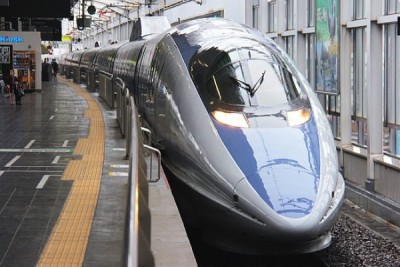Indonesian govt expediting plan to build high-speed train
Minggu, 25 Desember 2016 06:10 WIB - 0 Views
Reporter: Andi Abdussalam
Photo document of speed train in Japan. The Shinkansen is a network of high-speed railway lines in Japan operated by five Japan Railways Group companies. (japanguide.com)
Jakarta (ANTARA News) - The Indonesian government is increasing its lobbying with Japan to expedite its plans to build a semi-high speed train that will cover a distance of some 700 kilometers from Jakarta to Surabaya in East Java.
As the government has decided to complete the plan soon and move quickly on construction of the Jakarta-Surabaya semi-high speed train, ministers held a coordination meeting last month.
Those at the coordination meeting, which was attended by Luhut Binsar Panjaitan, Coordinating Minister for Maritime Affairs; Bambang Brodjonegoro, National Development Planning Minister/National Development Planning Agency (Bappenas) Head; and Sri Mulyani, Finance Minister, decided to speed up construction of the project.
For this purpose, Minister Luhut Binsar Panjaitan visited Japan on December 20-21 this week to discuss the medium fast train project with the Japanese.
The project has long been discussed, and since the beginning Japan has been offered to build the system.
Nevertheless, if there is a better opportunity, the government would consider it.
"Of course they (the Japanese) have the right, because they are involved in the feasibility study. We are looking for the cheapest, best, and fastest. Of course, there are options. We should not put all our eggs in one basket," Luhut said in Jakarta on Friday (Dec. 23, 2016).
In a press conference on Friday, Luhut said the government estimates that the Jakarta-Surabaya semi high-speed train project will cost Rp80 trillion.
The cost was based on a preliminary study conducted by the Ministry of Transportation and the Agency for the Assessment and Application of Technology (BPPT).
With a speed of 160 kilometers (km) per hour, and powered by electricity, the semi high speed trains will cover the Jakarta - Surabaya route in five hours.
Previous estimates indicate the semi-high speed train could reach a speed of 180 kilometers to 200 kilometer per hour, and shorten the travel time from Jakarta to Surabaya.
Currently, it takes about 10 hours to travel from Jakarta to Surabaya. However, with a medium-speed of 180 to 200 kilometers per hour, travel time between both cities could be shortened to below four hours.
Luhut said the trains electric power system would be a step forward in the use of technology, because other long distance trains continue to use diesel fuel. "For the cost, frankly, we would like to follow the DED (detailed engineering design) calculation. The cost figure released by the government of Japan is approximately Rp102 trillion. We see that the figure still could be lowered to about Rp80 trillion. Yet, the investment remains very large," he said.
Because of the high cost of the investment, Luhut said the government has decided to put in place a funding plan that requires cooperation between the government and business entities (KPBU), or through the Public Private Partnership (PPP).
Such a plan has been proposed by Minister of National Development Planning (PPN)/Head of National Development Planning Agency (Bappenas) Bambang Brodjonegoro. Bambang made the proposal because, based upon the law on railways, train lines are state assets that should be managed by the government.
The government would study the feasibility of adopting the public private partnership (PPP) for the project to be implemented jointly with Japan.
"We have discussed this alternative (PPP) with the Bappenas . We can invite the private sector to jointly fund the project, and will discuss this again," Luhut noted in a previous statement.
Therefore, it is expected that the project would not burden the state budget.
The cooperation scheme between the government and the private sector (PPP) could be used for alternative funding, since the government would seek to use most of its budget in 2017 for the development of rural areas and other regions outside Java Island.
"If it would be funded by the government, (the project) would add to the governments debt. It will burden the state budget. The governments policy is currently not to use too much of the funds in the budget for (development) in Java Island. We would rather use it for development of regions outside the island, as part of the efforts to ensure equitable development," he explained.
However, the project would not be fully handled by the private sector, as the government, based on the law on railways, is required to own the railway line.
Previously, Transportation Minister Budi Karya Sumadi had said that the government would maintain its ownership in the project, although it has yet to take a final decision and would use existing track lanes.
Regarding the approximate price of the semi fast Jakarta-Surabaya train tickets, Luhut estimated that the price will range from Rp500,000 to Rp600,000.
"Ticket prices are Rp500,000 - Rp600,000, but it depends on what we will still see," Luhut said.
In the meantime, a number of local East Java legislators said the Jakarta-Surabaya semi-high speed trains will boost the countrys economic development.
According to Zainul Lutfi, Commission B member of the East Java Regional Legislative Assembly (DPRD), the Jakarta-East Java train project will help equitably distribute economic development and increase economic activities in the regions.
However, he advised that the project should be accompanied by a comprehensive study, particularly in those regions where the train passes through.
His colleague, Abdul Halim of the DPRD Commission D, said he supported the project, but studies should be conducted to determine its feasibility, including the country that will build it.
(T.A014/INE/KR-BSR)
Editor: Priyambodo RH
COPYRIGHT © ANTARA 2016
http://m.antaranews.com/en/news/108594/indonesian-govt-expediting-plan-to-build-high-speed-train

















